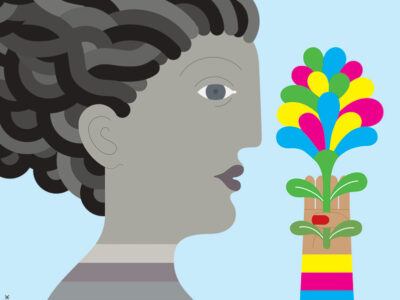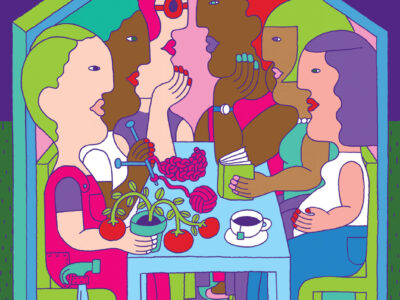
Nursing Conference | “I’m going to fetch a new baby,” expectant mothers in Tanzania tell their older children. “The journey is dangerous, and I may not return.” For women around the world, in all phases of life, “the journey” appears to be fraught with danger. Each year half a million women die from childbirth complications, and hundreds of thousands of women and children are sold into prostitution. Every minute five more women become infected with HIV.
Those were just a few of the grim numbers held up at the Penn Summit on Global Issues in Women’s Health—a conference organized in April by the School of Nursing. Scholars and health-care activists from 31 countries gathered for two days at the Annenberg Center to examine the health disparities that plague women and children.
“We have come together to do what none of us can do separately,” noted Penn President Amy Gutmann at the start of the conference: “to understand the threats to women’s health and safety in their global context, and their global impact. We have come together to develop the global strategies that we need to cope with the common threats that women face in every society, in every culture, in every nation in the world.”
It was Dr. Judith Rodin CW’66 Hon’04, chair of the summit, Rockefeller Foundation president and Penn’s president emerita, who shared the anecdote about Tanzanian mothers and some of the troubling statistics. But, she added, “I am confident that we can create a culture of safety for women. A culture that recognizes that safety and education and employment and human rights … affect a woman’s health and, in turn, a woman’s health affects her family, her community, and a nation’s social and economic development.”
Simply pouring money on the problems—and investing in more medicines, medical equipment, or health workers—isn’t enough, according to the Hon. Mary Robinson, former president of Ireland and executive director of the Ethical Globalization Initiative. “The health field is littered with the remains of major initiatives devoting billions of dollars to interventions that ultimately fail to improve access and utilization of life-saving services, particularly for the poor,” she said. “Many of the barriers to improved health for women around the world are cultural, behavioral, and based on unequal power relationships between men and women.”
Dr. Aurora del RioZolenzi, deputy general director of equity and health for the Mexican Ministry of Health, noted that women’s societal roles often negatively affect health outcomes.
“Most women are mainly the daughter of someone, the wife of someone, someone’s mother, someone’s aunt, but not themselves,” she said, and are too busy caring for others to see to their own health. “Even if they do have access to health care, they probably don’t have control of those resources,” she added. To go to the doctor, “they need the approval of someone else—their husband, their mother-in-law … ”
In addition, pointed out Dr. Geeta Rao Gupta, president of the International Center for Research on Women, when it comes to preventing HIV/AIDS, “women’s economic dependency on men often restricts their abilities to negotiate condom use with their partner, and makes it difficult to leave risky relationships.”
Prostitution is often defined as the oldest occupation.
“ I want to say it’s the oldest form of oppression the world has ever seen,” said Dr. Esohe Aghatise, an attorney working with sex-trafficking victims in Italy. Many of these victims come from her native Nigeria, where polygamy is still common but the farm-based economy that once supported this practice is dying out. “Now they move to urban cities,” Aghatise noted, “and a man who married more wives has a huge problem taking care of his family.” As a result, many women are forced to turn to prostitution to take care of their children.
She described how voodoo rituals are often used by traffickers to control their victims. “They’re made to eat or drink something, and it becomes a promise not to reveal who has taken them to Europe and not to say anything to police, even if they’re caught on the street.”
Laura Lederer, a senior advisor on trafficking for the U.S. Department of State, told the story of “Rosa,” a Mexican girl who crossed the border on the promise of a lucrative waitressing job, only to be sold to a Florida brothel where she was gang-raped, twice impregnated and forced into abortions, and pistol-whipped when she tried to escape. “If you take Rosa’s story, and multiply it by hundreds of thousands or millions, you get an idea of the magnitude [of sexual trafficking] around the world.”
Dr. Ameporn Ratinhorn, a nursing professor at Thailand’s Siriraj Mahidol University, argues that it is the illegal status of sex workers that “makes them vulnerable to violence.” Without legal protections from a regulated sex trade, they are subject to physical assault, threats to take money, and refusal by clients to wear condoms. Most women enter this field for their family’s survival, she noted. “Their parents may have gotten sick, or they may have to pay back money they’ve borrowed.”
Focusing on another kind of violence, Dr. Janice Asher says she sees a victim of date- or acquaintance-rape every week at Penn’s Student Health Service, where she works as clinical director of women’s health. “What is so paramount in all forms of violence is that so often we blame the victim,” she said: “‘If it’s so bad, why don’t you leave?’ If I were hit by a car on the way here, no one would say, ‘Why didn’t you take the train?’”
“Men will start to respect women who bring money to the house,” said Hans Dellien, manager of microlending services for Women’s World Banking. “By lending to women, you move them from a beneficiary or subordinate situation in the household to the person who generates income and earns respect, first from her partner and also later, when she’s able … to share her experience, with other women, and this empowers them.”
Small-business loans that help shift the balance of power between men and women—along with girls’ education and women’s leadership training—were presented as strategies for improving health outcomes for women around the world.
The Hon. Marjorie Margolies-Mezvinsky CW’63, a senior lecturer at Penn’s Fels Institute of Government, a former congresswoman, and chair of Women’s Campaign International, trains women in developing nations to run for elected office and become advocates on a variety of issues, including HIV/AIDS. Working in Malawi, for example, her organization got women parliamentarians to agree to be tested for HIV and then go into the villages to encourage other women to follow their example.
May Rihani, director of the Center for Global Equity, said improving girls’ education could be a powerful tool to reduce teen birth rates, improve nutrition, increase immunization rates, and reduce child mortality. Studies show that “the intersection of illiteracy and poverty is detrimental to women’s health and the health of families,” she said.
The proposals that emerged from the health summit stretched from small-scale transformations—such as the grocery a Dominican woman could start out of her home with a microloan—to a “revolution” called for by the Hon. Stephen Lewis, speaking angrily out of his experience as U.N. special envoy for HIV/AIDS in Africa.
“What we have here is the most ferocious assault ever made by a communicable disease on women’s health, and there is just no concerted coalition of forces to go to the barricades on women’s behalf,” he said. “I want a kind of revolution in the world’s response—not another stab at institutional reform but a virtual revolution.”
Lewis urged the conference participants and their institutions to support the development of a microbicide that would permit conception but prevent HIV transmission, and push for greater representation of women within U.N. agencies to make sure women’s health issues aren’t ignored. “A similar movement must be directed to Africa itself,” he said. “The African leadership at the highest level is not at all engaged when it comes to women’s health.
“We’re looking towards the day,” Lewis continued, “when governments are finally made to understand that women constitute half of everything that affects humankind and therefore must be engaged in absolutely everything.”—S.F.




